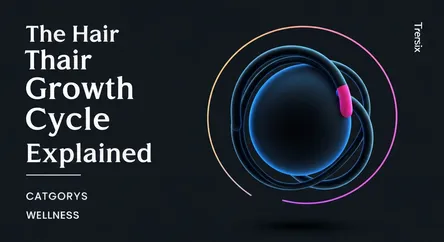Wellness
The Hair Growth Cycle Explained

Discover the four phases of the hair growth cycle and how understanding them is key to achieving healthier, fuller hair and preventing hair loss.
What is it?
The hair growth cycle is the natural process of hair formation and shedding. It consists of four distinct phases. First is the Anagen (Growth) phase, where hair actively grows from the follicles; this stage can last for 2-7 years. Next is the Catagen (Transition) phase, a short period of about two weeks where the hair follicle shrinks and detaches from the blood supply. The third phase is Telogen (Resting), which lasts for about three months. During this time, the hair doesn't grow but stays in place while a new hair begins to form beneath it. The final stage is Exogen (Shedding), where the old hair falls out as the new hair pushes through. It's normal to shed 50 to 100 hairs a day during this phase.
Why is it trending?
There is a growing "skinification" of hair care, where scalp health is seen as the foundation for healthy hair. Consumers are becoming more educated and proactive, seeking to understand the science behind hair health to address concerns like thinning and slow growth. This knowledge empowers them to choose targeted products and treatments that support the hair follicles during each phase. Discussions around wellness have expanded to include hair health, linking factors like diet, stress, and hormones to the hair cycle, making it a popular topic in beauty and self-care circles.
How does it affect people?
The hair growth cycle dictates the length and density of a person's hair. Various factors like age, genetics, stress, nutritional deficiencies, and hormonal changes can disrupt this cycle. When the cycle is disturbed, for instance, by forcing more hairs into the Telogen (resting) phase prematurely, it can lead to noticeable thinning or excessive shedding, a condition known as telogen effluvium. Understanding the different phases helps individuals distinguish between normal hair shedding and significant hair loss that may require medical advice. This knowledge encourages healthier lifestyle choices and hair care routines to support the cycle and promote optimal hair growth.